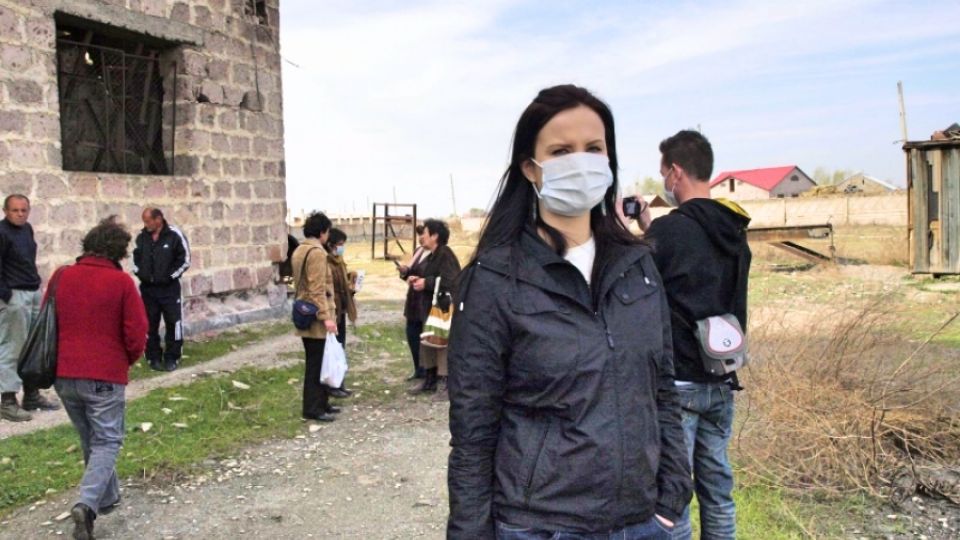The main goal of the join project between two ngos, one Czech and one Armenian, was to help the rural communities to implement sustainable agriculture and eliminate the danger of chemical pollution in Ararat and Armavir regions. This project was launched by Czech not-for profit organization Arnika and Armenian Women for Health and Healthy Environment (AWHHE). The project is focused on finding of technical solutions to eliminate several hot spots of contamination caused by obsolete toxic pesticides released into the environment by their improper management and storage. This includes so called persistent organic pollutants (POPs). The project will also help Armenia to implement the aims of the international Stockholm Convention.
“Since 1960s, hundreds of tons of pesticides have been used in agriculture. We can still feel the consequences in the form of serious contamination of particular places,” says Lilik Simonyan, AWHHE executive director. “In our project, we wish to find the solutions for at least some of the most disturbing cases, and show the alternative ways of environmentally responsible and economically modest agriculture. Although the pesticides that are on sale now, are not banned by Stockholm Convention, they also pose a risk on human health,” refers Mrs. Simonyan.
AWHHE expects solution to some of the most disturbing cases. "Placing the problem of obsolete pesticides hot spots in political agenda should be our main goal," says Mrs. Lilik Simonyan. She also mentioned the organization´s disappointment with the current situation which is very unsatisfactory. In some cases, the situation has even worsened during last year. The conclusion of a recent visit to the most discussed burial site in administrative area of Yerevan, between Voghchaberd and Geghadir villages of Kotayk marz, which constitutes a serious threat despite of years of lobbying, confirms this findings. This obsolete pesticides burial site will be one of the main cases to be solved by the project.
Arnika will us its expertise to highlight the real danger of the pesticides stored and possibly being still used in the selected hot spots. They have experience from cleaning up similar burdens in the Czech Republic. “It is necessary not only to clean-up contaminated sites, but also to deal with the contamination responsibly, we cannot to allow a new risk to the public health and the environment”, says Jindřich Petrlík, executive director of Toxics and Waste program of Arnika. He stresses, that non-combustion technologies should be used for the cleanup to prevent further pollution of the environment.
Both AWHHE and Arnika believe that only cooperation of the non-governmental organizations, regional authorities, municipalities, governmental bodies, and experts can bring sustainable solutions. Project activities will also consist of educational programs for villagers and farmers. “It is essential to give the people as many opportunities to participate in decision-making procedures as possible,” says Martin Skalský of Arnika. In a similar case in Czech village Pozďátky, close cooperation of all stakeholders led to the cleanup of a broken, hazardous waste storage in several years.
A joint project of Arnika Association and Armenian Women for Health and Healthy Environment (AWHHE) is called "Scaling Up Experience in Improvement of Chemical Safety to Contribute to Poverty Reduction in Rural Armenia." It is financed by EU Aid Fund, Global Environmental Facility through UNDP, Global Greengrants Fund, International POPs Elimination Network, and Women in Europe for a Common Future (WECF). The start-up meeting of the project took place in Yerevan on March 29, 2010.
Armenian Women will organize seminars and workshops, to establish a network of Armenian civic associations and an information center for chemical safety in Yerevan. This will enable the interested people to get information easily, and it will strengthen the cooperation among non-governmental sectors with other parts of the society.
“Chemical contamination can debase the quality of water, soil, and other aspects of the environmental. This vicious cycle of dependency can be broken by raising awareness and promoting alternatives,” says Lilik Simonyan, an expert of the AWHHE on toxic chemicals. Due to a lack of relevant information, citizens are not able to organise and fight for their rights. This is another issue which should also be addressed by the project activities.







